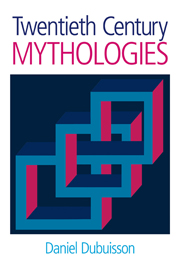Book contents
- Frontmatter
- Epigraph
- Contents
- Foreword by Professor Robert A. Segal
- Preface
- Abbreviations
- Introduction: History and comparative epistemology
- Part I Georges Dumézil, or Society
- Part II Claude Lévi-Strauss, or the Mind
- 7 The symbolic order
- 8 The Mythologiques: from overture to finale
- 9 From Marx to Kant
- 10 The semantics of myth
- 11 A Buddhist among the Bororo
- Part III Mircea Eliade, or the Sacred
- Conclusion: Modern theories of myth and the history of Western thought
- Bibliography
- Index
7 - The symbolic order
from Part II - Claude Lévi-Strauss, or the Mind
- Frontmatter
- Epigraph
- Contents
- Foreword by Professor Robert A. Segal
- Preface
- Abbreviations
- Introduction: History and comparative epistemology
- Part I Georges Dumézil, or Society
- Part II Claude Lévi-Strauss, or the Mind
- 7 The symbolic order
- 8 The Mythologiques: from overture to finale
- 9 From Marx to Kant
- 10 The semantics of myth
- 11 A Buddhist among the Bororo
- Part III Mircea Eliade, or the Sacred
- Conclusion: Modern theories of myth and the history of Western thought
- Bibliography
- Index
Summary
Claude Lévi-Strauss belongs to the very restricted group of scholars of whom one can say that they shed new light on man and his world: one of those whose irresistible forays go beyond the limits of their speciality in order to embrace the human condition and the exercise of intellectual activity. This means that any critique levelled at one or other of their hypotheses or demonstrations can never remove the indelible trace they have left in the history of thought.
Born in 1908, Lévi-Strauss grew up in a family that included several artists, painters, and musicians. If money problems were frequent, as a young man he nevertheless enjoyed an intellectual atmosphere that was both stimulating and liberal. After studying law and philosophy (he finished third in his year on graduation in 1931), and rather briefly teaching in a high school, Lévi-Strauss left for Brazil in 1935 to accept a professorship in sociology at the University of São Paolo. This Brazilian sojourn, which was interrupted in the winter of 1936-37, but which would last until the beginning of 1939, allowed him to lead two long ethnographic expeditions (among the Caduveo and the Bororo in 1936; then in 1938 among the Nambikwara). This field experience was no doubt decisive for Lévi-Strauss the philosopher, as it put him in contact with actual indigenous people, that is, with “primitive” forms of thought and symbolic systems.
- Type
- Chapter
- Information
- Twentieth Century Mythologies , pp. 105 - 116Publisher: Acumen PublishingPrint publication year: 2006



